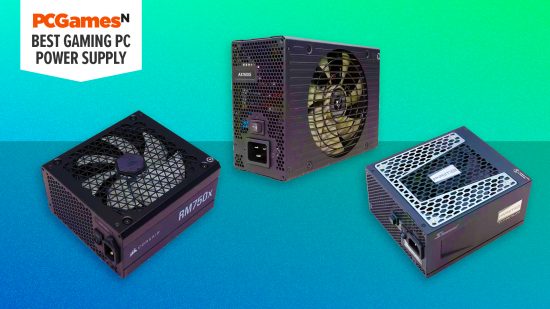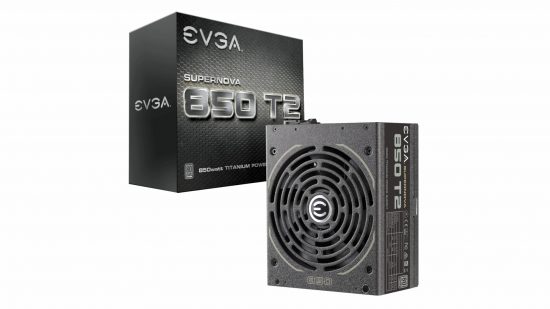The best power supply for PC gaming can make an enormous difference to the ease of use of your machine. The Power Supply Unit (PSU) converts electricity from the power outlet into usable power for your PC components, ensuring they get the power they need to function.
If you invest in a quality power supply, it’ll likely become the longest-standing part of your system, as it stands up to years of future upgrades and lets you keep the best gaming PC you own running smoothly. You might be tempted to cheap out on your PSU but with the latest best graphics card and best gaming CPU options sometimes demanding huge amounts of power, a quality, efficient power supply is essential to ensuring your system runs smooth, quiet, and cool.
Why you can trust our advice ✔ At PCGamesN, our experts spend hours testing hardware and reviewing games and VPNs. We share honest, unbiased opinions to help you buy the best. Find out how we test.
How to choose a power supply
There are four main factors to consider when choosing a power supply unit (PSU). The first is what size of PSU you need.
If you’re building a normal-sized PC, you will just need a normal-sized ATX PSU. However, some smaller and cheaper cases can be a bit cramped when it comes to power supply space so it’s worth checking the PSU space measurements of your case first. Meanwhile, if you’re building a small form factor (SFF) PC, many SFF cases do still use full-size power supplies, but the smallest use the SFX standard. Again, check your PC case‘s specs to find out which you need.
Once you’ve chosen the size you need, the next choice you have is how much power you need. Modern high-end graphics cards can demand huge amounts of power with the RTX 4090 rated to 450W and the RTX 5090 a colossal 600W. Moreover, they stipulate that you should have at least a 1,000W power supply to power these cards.
Nvidia usefully provides the recommended “system” power for its latest graphics cards on the specs page for each card, so the RTX 5070, for instance has its power supply requirement listed here as 650W while the RTX 5070 Ti needs a 750W unit.
AMD also suggests power supply ratings on its card pages. For instance, it rates the RX 7900 XTX as needing an 800W power supply while the RX 7800 XT needs a 700W supply.
Another side consideration if how many extra cables your graphics card needs. High-end cards need one or more extra cables that plug into the top of the card, so you need to make sure your power supply has the right cables. Most of the time, the more powerful the supply, the more of these cables it can accommodate, so if you buy a PSU based on your graphics card’s power recommendation you should be fine, but it’s worth checking.
Your next choice is to decide how efficient a supply you need, which is the ratio of how much power comes into the supply and how much it can deliver to your PC – the rest is lost as heat. The 80 Plus standard stipulates several levels of efficiency that start at 80% efficiency and rise to 90-96% efficiency. The more efficient, the more you’ll pay but the less energy you waste over the many year life of the PSU. Plus, it’s less heat dumped into your PC case. We generally recommend aiming for a gold or platinum rating as a good balance of efficiency and not extortionate up front cost.
You final choice – other than design factors such as color – is whether to opt for a modular, non-modular, or semi-modular design. This refers to the ability to unplug the cables from the power supply, allowing you to only fit the internal PC cables you need, saving space and making for a tidier, easier build. Fully modular supplies are the most versatile but most expensive, semi-modular only have the less-common cables be removable and are a bit cheaper, while non-modular supplies have all the cables fixed in place but they’re the cheapest option.
FAQ
What is a power supply?
When it comes to PCs, the main power supply unit (PSU) is the box into which you plug a mains power cable that then converts the 120V or 230V alternating current (AC) power from your wall sockets to the direct current (DC) 12V, 5V and 3.3V power required by the components of your PC.
They come in a wide range of power and efficiency ratings that tell you how much power the components of your PC can safely draw from the power supply and how much energy is lost in that conversion process. Most modern power supplies can deliver between 500-1500W and between 80-95% efficiency – 5-20% of lost energy is dispersed as heat.
What is 80 Plus Certification?
80 Plus Certification is something that manufacturers can submit their products to. If they receive the certification, it means that you can count on the product to run to a certain level of efficiency. Here’s the benchmark for each certification:
- Standard certification: 80 – 85% efficiency
- Bronze certification: 85 – 88% efficiency
- Silver certification: 85 – 90% efficiency
- Gold certification: 87 – 92% efficiency
- Platinum certification: 89 – 94% efficiency
- Titanium certification: 90-96% efficiency
If you’re thinking that the overlap of several of these certifications means that you might get a more efficient power supply with bronze certification than with the standard certification, that’s not quite how it works. With any particular setup, a higher certified PSU will always run better than a lower one, the range merely reflects different levels of efficiency when using them in different types of setup.
What is form factor?
The form factor refers to the size of the motherboard in which the power supply will be housed. The majority of the PSUs that we’ve detailed in this list are standard ATX, which will work across most motherboards, though we’ve included one SFX (Small Form Factor) option for anybody working with something that isn’t so big. If you’re shopping for the first time, we recommend double-checking the form factor of your motherboard.
What power supply is needed for RTX 4090 and other high-end components?
The likes of the Nvidia GeForce RTX 4090 and Intel Core i9-14900K can draw huge amounts of power, drawing over 500W from the wall each when pushed to their max. As such, you’ll need at least a 1000W power supply for such high-end components, and ideal at least 1200W. The RTX 5090 is rated to draw even more than the RXT 4090, with it alone demanding up to 600W.
What size power supply do I need?
Size isn’t the right term when most people talk about power supplies – while PSUs do range in physical size, they’re mostly quite similar. Instead, ‘size’ refers to the power rating of the power supply, and what you need will vary based on your system.
For an entry-level gaming PC with integrated graphics or a graphics card that doesn’t require an extra cable to be plugged into it (so it draws less than 70W) and a CPU that’s six or fewer cores, a quality high-efficiency 500W supply should do the job, though you might want to go for a 650W unit to be on the safe side – especially if it’s not 90%+ efficient.
As you buy more powerful components, you’ll have to consider upgrading your power supply, as not only do more powerful chips require more power but graphics cards in particular require specific extra cables. By the time you’re buying an RTX 4070 and an AMD Ryzen 7 7800X3D, you’ll be wanting a 750W supply.
To find out just what sort of supply you’ll need, check the specifications of your other components and add up the total peak power draw. It doesn’t need to be exact but if your chosen CPU can draw over 350W alone, a 400W power supply probably won’t be enough.
Many manufacturers and retailers have power calculators that can estimate how much power your system will need. Here are a few:
- MSI PSU Calculator
- Cooler Master Power Calculator
- Seasonic Wattage Calculator
- be quiet! PSU Calculator
- Newegg PSU Calculator
What type of power supply is the most efficient?
No power supply will ever be 100% efficient, because it is not possible to avoid losing power in the process of converting AC power from the wall into the DC power that your gaming PC uses to function. The highest level of efficiency that you can expect is from an 80 Plus Titanium supply rated to between 90-96% efficiency.







